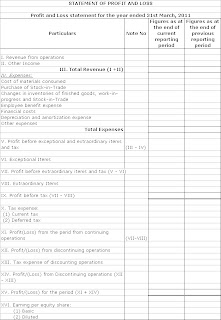The Revised Schedule VI for companies by Ministry of Corporate Affairs (MCA) introduces new formats and various new disclosure requirements.
With my blog here I am highlighting the major significant changes of the revised Schedule VI
Changes in Balance Sheet
Liabilities
- A new head ‘Share Application Money Pending Allotment’ has been introduced.
- Debit Balance of Profit & Loss A/c should be shown as negative figure under the head Surplus.
- Liabilities should be broadly classified under the heads-
·
Current Liabilities
·
Non-Current Liabilities
- Current maturities of Long Term Borrowing shall be separately specified under the head Other Current Liabilities.
- Provisions should be classified under the head-
·
Short Term Provisions
·
Long Term Provisions
- Loans & Advance from related parties should be separately specified under the head Long-Term Borrowings where Related Parties include Joint Company, Associate, Holding Company, Subsidiary Company etc.
Assets
1. Assets should be broadly classified under the
heads-
·
Current Assets
·
Non-Current Assets
2. Fixed Assets should be broadly classified
under the heads-
·
Tangible Assets
·
Intangible Assets
3. Capital Advances should be shown separately
under the head Long Term Advances
which in
earlier Schedule VI had to be added to Capital Work-In-Progress
- Miscellaneous Expenditure to the extent not written off shall be shown under the head ‘Other Current Assets’.
5. ‘Cash &
Bank Balance’ have now been termed as ‘Cash & Cash Equivalents’.
Changes in Profit & Loss A/c
1. A
specific format has been issued for reporting Profit & Loss A/c .
2. Exceptional
and Extra-ordinary items should be disclosed separately.
Exceptional Items- On certain
occasions the size, type or incidence of an item of income or expenditure
pertaining to ordinary activities of the company is such that its disclosure
improves the understanding of the performance of the company. Such items are
called Exceptional Items.

